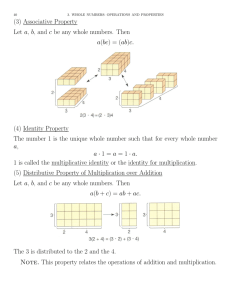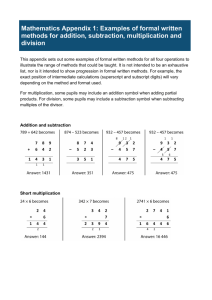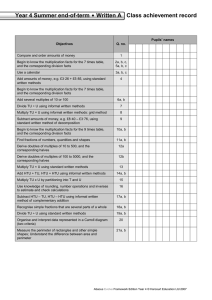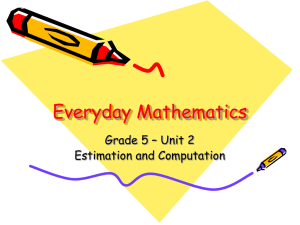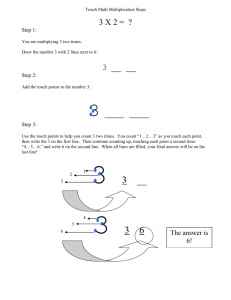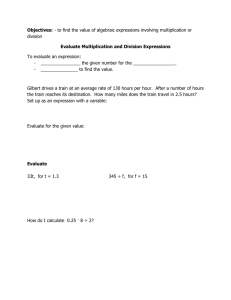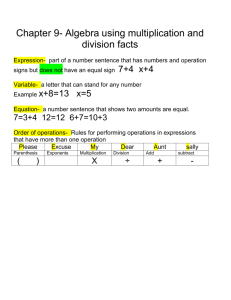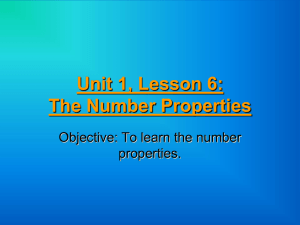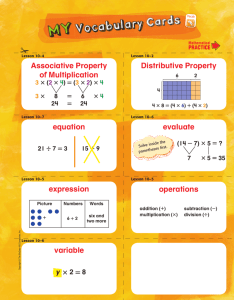Calculation Policy - Multiplication and Division
advertisement
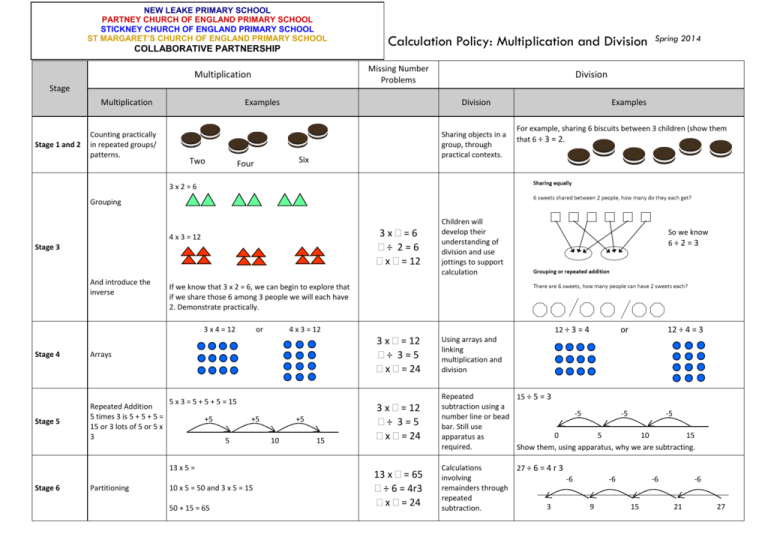
NEW LEAKE PRIMARY SCHOOL PARTNEY CHURCH OF ENGLAND PRIMARY SCHOOL STICKNEY CHURCH OF ENGLAND PRIMARY SCHOOL ST MARGARET’S CHURCH OF ENGLAND PRIMARY SCHOOL COLLABORATIVE PARTNERSHIP Calculation Policy: Multiplication and Division Missing Number Problems Multiplication Spring 2014 Division Stage Multiplication Stage 1 and 2 Counting practically in repeated groups/ patterns. Examples Two Division Sharing objects in a group, through practical contexts. Six Four Examples For example, sharing 6 biscuits between 3 children (show them that 6 ÷ 3 = 2. 3x2=6 Grouping 4 x 3 = 12 Stage 3 And introduce the inverse Arrays Stage 5 Repeated Addition 5 times 3 is 5 + 5 + 5 = 15 or 3 lots of 5 or 5 x 3 or Partitioning 3 x = 12 ÷ 3=5 x = 24 Using arrays and linking multiplication and division 3 x = 12 ÷ 3=5 x = 24 Repeated 15 ÷ 5 = 3 subtraction using a -5 -5 -5 number line or bead bar. Still use 0 5 10 15 apparatus as required. Show them, using apparatus, why we are subtracting. So we know 6÷2=3 +5 +5 5 10 x 5 = 50 and 3 x 5 = 15 50 + 15 = 65 12 ÷ 3 = 4 4 x 3 = 12 5 x 3 = 5 + 5 + 5 = 15 13 x 5 = Stage 6 Children will develop their understanding of division and use jottings to support calculation If we know that 3 x 2 = 6, we can begin to explore that if we share those 6 among 3 people we will each have 2. Demonstrate practically. 3 x 4 = 12 Stage 4 3x =6 ÷ 2=6 x = 12 +5 10 15 13 x = 65 ÷ 6 = 4r3 x = 24 Calculations involving remainders through repeated subtraction. or 12 ÷ 4 = 3 27 ÷ 6 = 4 r 3 -6 3 -6 9 -6 15 -6 21 27 NEW LEAKE PRIMARY SCHOOL PARTNEY CHURCH OF ENGLAND PRIMARY SCHOOL STICKNEY CHURCH OF ENGLAND PRIMARY SCHOOL ST MARGARET’S CHURCH OF ENGLAND PRIMARY SCHOOL Calculation Policy: Multiplication and Division COLLABORATIVE PARTNERSHIP Missing Number Problems Multiplication Spring 2014 Division Stage Multiplication Stage 7 Informal examples Formal Method 38 x 7 266 Multiplication of TU x U 5 Division Using the methods children are learning Long Division by about subtraction of 3 x 7 = 266 ÷ 6 = 4r3 x = 420 multiples TU ÷ U Examples 3 4 r 3 or 4 6 6 27 - 2 4 (4 x 6) 3 1 6 x 345 = 2070 Stage 8 Multiplication of HTU x U Then THTU x U x 300 6 1800 40 5 240 30 345 x 6 2070 23 2 3 r 1 or 23 6 6 139 - 6 0 (10 x 6) 79 (10 x 6) 60 - 1 9 (3 x 6) 18 Using the methods children are learning Long Division by about 3 5x = 2070 ÷ 6 = 23r1 subtraction of multiples HTU ÷ U 52 x 27 Stage 9 Using the methods children are learning about Multiplication of TU x TU then HTU x TU 2 x 52 = 1512 432 ÷ = 28r12 42 x 5.3 Short Division 5 Stage 10 Multiplying decimals HTU ÷ TU 40 200 2 10 0.3 12 0.6 212 10.6 222.6 42 x 5.3 1 2 .6 1 2 1 0 .0 2 2 2 .6 Spring 2014 Calculation Policy: Multiplication and Division Multiplication Division Stage Multiplication Stage 8 Examples Division Grid Method It is better to place the 38 x 7 = 266 number with the most digits in the left-hand column of the grid so that it is easier to add the answers of each part of the multiplication together. 7 x 38 = 56 ÷ 4 = 14 Introduce short division with no remainders for small divisors. Ensure children understand their place value. Do this for TU ÷ U questions with no remainder. Link to their knowledge of times tables. Then move onto to HTU x U using the same method (e.g.) 346 x 5 Develop this into TU ÷ U with remainders, still keeping divisor relatively small. Check responses with the inverse. 42 x 5.3 Then move on to U.t x U.t (e.g.) 4.6 x 5.9 51 6 We know this because we know that 4 x 10 = 40 and 4 x 4 = 16, 40 + 16 = 56 1 3 r1 Then move onto HTU x TU using the same method (e.g.) 427 x 36 Stage 10 4 79 ÷ 6 = Multiplying two, two digit numbers This follows the same steps as the first grid method but for 2 digit numbers. Using grid method to multiply decimals. Start with TU x U.t 1 4 Use apparatus to demonstrate. 56 x 27 = 1512 Stage 9 Examples 40 2 5 0.3 200 10 12 0.6 212 10.6 222.6 6 719 Check with 6 x 13 = 78 78 + 1 = 79 Short division is used for HTU ÷ U questions with remainders (which may be turned into decimals by level 5 children) Extension—use short division for HTU ÷ TU (where the divisor is less than 20 to begin with), writing down multiples first. NEW LEAKE PRIMARY SCHOOL PARTNEY CHURCH OF ENGLAND PRIMARY SCHOOL STICKNEY CHURCH OF ENGLAND PRIMARY SCHOOL ST MARGARET’S CHURCH OF ENGLAND PRIMARY SCHOOL COLLABORATIVE PARTNERSHIP 3 2 17 5 4 34 17 34 51 68 85 102
